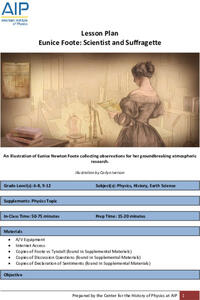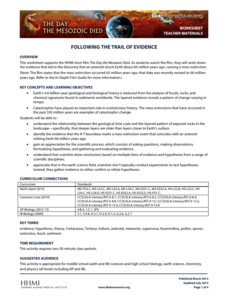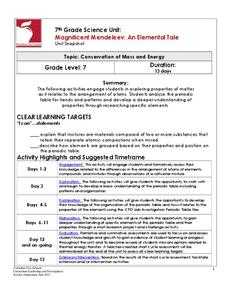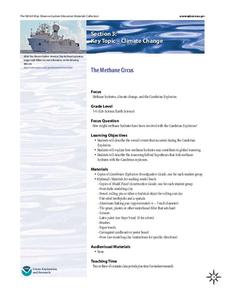American Institute of Physics
Eunice Foote: Scientist and Suffragette
The greenhouse effect and climate change are hot topics in today's news. Young scientists may be surprised to learn that the concept is not a new one. In fact, Eunice Newton Foote, scientist, inventor, and suffragette, discovered the...
American Institute of Physics
African American Inventors in History
A two-part lesson introduces young historians to the work of famous African American inventors. Groups first research and develop a presentation of an inventor that includes biographical information and information about one of their...
Koshland Science Museum
Infectious Disease: Evolving Challenges to Human Health Middle School Virtual Field Trip
Is there one right way to control infectious diseases? Learners determine the facts each stakeholder must consider when making their recommendations for controlling a disease threatening their area. They take into account public health,...
National Academy of Sciences
Lights at Night Webquest
Help learners find ways to become more efficient energy consumers. To start, individuals research how different countries address energy efficiency and then analyze their own carbon footprint. They use their research to identify ways to...
Cornell Lab of Ornithology
Jump, Glide, or Fly? Exploring Bird Evolution
How have birds evolved from prehistoric animals? With the three-part instructional activity, small groups first research different prehistoric animals and determine whether they are birds. Then, scholars explore different bird...
New York City Department of Education
Straw Rockets
Scholars become rocket scientists as they take off on a journey exploring Newton's laws of motion. After learning the laws of motion, pupils design their own investigations using straw rockets. They highlight their literacy skills in a...
Howard Hughes Medical Institute
Following the Trail of Evidence
One important skill in analyzing scientific evidence is identifying facts versus opinions. Scholars identify pieces of evidence from the film The Day the Mesozoic Died and then discuss this evidence in small groups at the end of each act...
Core Knowledge Foundation
Chaos within the Living World? NOT!
What are the five kingdoms? Fifth graders engage in a series of investigations and research activities focused on the methods of classification used by scientists, as well as the language they use to describe the similarities and...
Essential Energy
Being a Safety Star (Stage 3)
A spark of static electricity contains up to 3,000 volts, while a lightning strike contains around 3,000,000 volts. To understand electricity, its power, and the safety considerations relating to it learners engage in a comprehensive...
EngageNY
TASC Transition Curriculum: Workshop 15
What do a cheetah, Audi commercial, and air have in common? They're all topics of an engaging inquiry-based, hands-on workshop for educators about background knowledge, reading strategies, the CER model, and argumentative writing. The...
EngageNY
TASC Transition Curriculum: Workshop 9
Here's a workshop for teachers that rocks the academic world! Using earthquakes as a medium for instruction, educators learn about crosscutting engineering with science. Fun, hands-on, collaborative exercises encourage participants to...
Scholastic
Opioids and the Overdose Epidemic
Learn about the opioid and overdose epidemic in America with an article that explains what opioids are, how they are used, and how they are abused. Learners discover the death rates associated with opioid overdoses and other factors that...
NOAA
A Day in the Life of an Ocean Explorer
What's life like aboard an ocean exploration vessel? Junior oceanographers examine the important role of communication in ocean research in lesson two of a five-part series from NOAA. The materials introduce the class to life on board...
Towson University
Looking Backwards, Looking Forward
How do scientists know what Earth's climate was like millions of years ago? Young environmental scholars discover how researchers used proxy data to determine the conditions present before written record. Grouped pupils gain experience...
Polar Trec
Why Can’t I Eat This Fish?
Can turning on the television lead to toxins in the food supply? The lesson offers an opportunity for young scientists to complete guided research. A worksheet lists each question as well as the web page necessary to answer the question....
Polar Trec
Touring the Poles
Would you want to vacation in the Arctic or Antarctic regions? Scholars research both regions and produce a travel brochure trying to convince tourists to visit. The project focuses on the geography, climate, flora, fauna, and indigenous...
NOAA
Fishy Deep-sea Designs!
Oceans represent more than 80 percent of all habitats, yet we know less about them than most other habitats on the planet. The instructor introduces the epipelagic, mesopelagic, bathypelagic, twilight, and midnight zones in the ocean....
Columbus City Schools
Moon Phase Mania
Now you see it, now you don't. Our moon seems to pull a disappearing act from time to time—but why? Take your seventh grade scientists above and beyond to discover the truth about the moon and the role it plays in Earth's little corner...
Columbus City Schools
Let’s Get Theoretical About Cells
Get up close and personal with cells in a hands-on journey to discover what makes up living things. Scholars learn valuable microscope skills, delve into the Modern Cell Theory, and gain insight into how cells reproduce. The included lab...
Columbus City Schools
What is Up Th-air? — Atmosphere
Air, air, everywhere, but what's in it, and what makes Earth's air so unique and special? Journey through the layers above us to uncover our atmosphere's composition and how it works to make life possible below. Pupils conduct research...
Columbus City Schools
Magnificent Mendeleev: An Elemental Tale
Discover how the periodic table tells the story of its elements. Learners begin by studying the makeup of several mixtures. Their analysis leads to a discussion of elements and the periodic table. As they dig deeper, they understand the...
NOAA
Animals of the Fire Ice
When the sun's rays can't reach the producers in a food web, where does all the energy come from? Extreme environments call for extreme food sources. Young scientists investigate creatures that appear to get their energy from methane...
NOAA
The Methane Circus
Step right up! An engaging research-centered lesson, the third in a series of six, has young archaeologists study the amazing animals of the Cambrian explosion. Working in groups, they profile a breathtaking and odd creature and learn...
NOAA
What Killed the Seeds?
Can a coral cure cancer? Take seventh and eighth grade science sleuths to the underwater drugstore for an investigation into emerging pharmaceutical research. The fifth installment in a series of six has classmates research the wealth of...

























